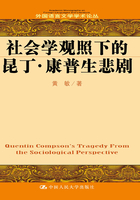
Acknowledgements
The genesis of this book comes from a one-year stay in Japan, as part of the three-year doctoral program co-hosted by the professors at Kwansei Gakuin University and Beijing International Studies University (BISU). Two professors, Professor Hua Mingda and Professor Yu Kang initiated the program to allow Chinese teachers chances for academic improvement in one of Japan’s most prestigious universities.Therefore, my sincere thanks first go to Professor Hua, who is now retired, and Professor Yu, who is still happily working, that life yields abundance for both of them, be it at work or at home.
While in Japan I was able to do research under the instruction of a panel of professors, headed by Professor Sugiyama, who willingly offered me the most encouraging, generous and illuminating advice, organized meetings and seminars, read and gave suggestions on my papers, lent me books on Faulkner and recommended me to other Faulknerians in Japan. My heartfelt thanks go to all of them for their effective and timely instruction, in particularly, Professor Sugiyama whose support has been instrumental in helping me forge the ideas about my research, and has been of the kind that, without which, my research and study would never have been completed.
My deepest gratitude is reserved for Professor Su Gang, who acted as the Chinese tutor responsible for my study at home and took care to help me with my work and research. He was most patient with my clumsy management of time and was the one I had more than once troubled with the last-minute urgencies. Yet his advice on my work never fails to impress me with a scholar’s sharp mind and penetrating insights.
Finally, the book would never have materialized without the academic funding from BISU, the help from my colleges and friends, as well as my family. To name a few: Long Yun, who gave help on publishing business, Wang Hong, Yang Hong and Tao Ying, who allowed me time to work while I struggled with my book. Lastly, love to my husband and my son, for their unyielding patience and understanding as members of the family.